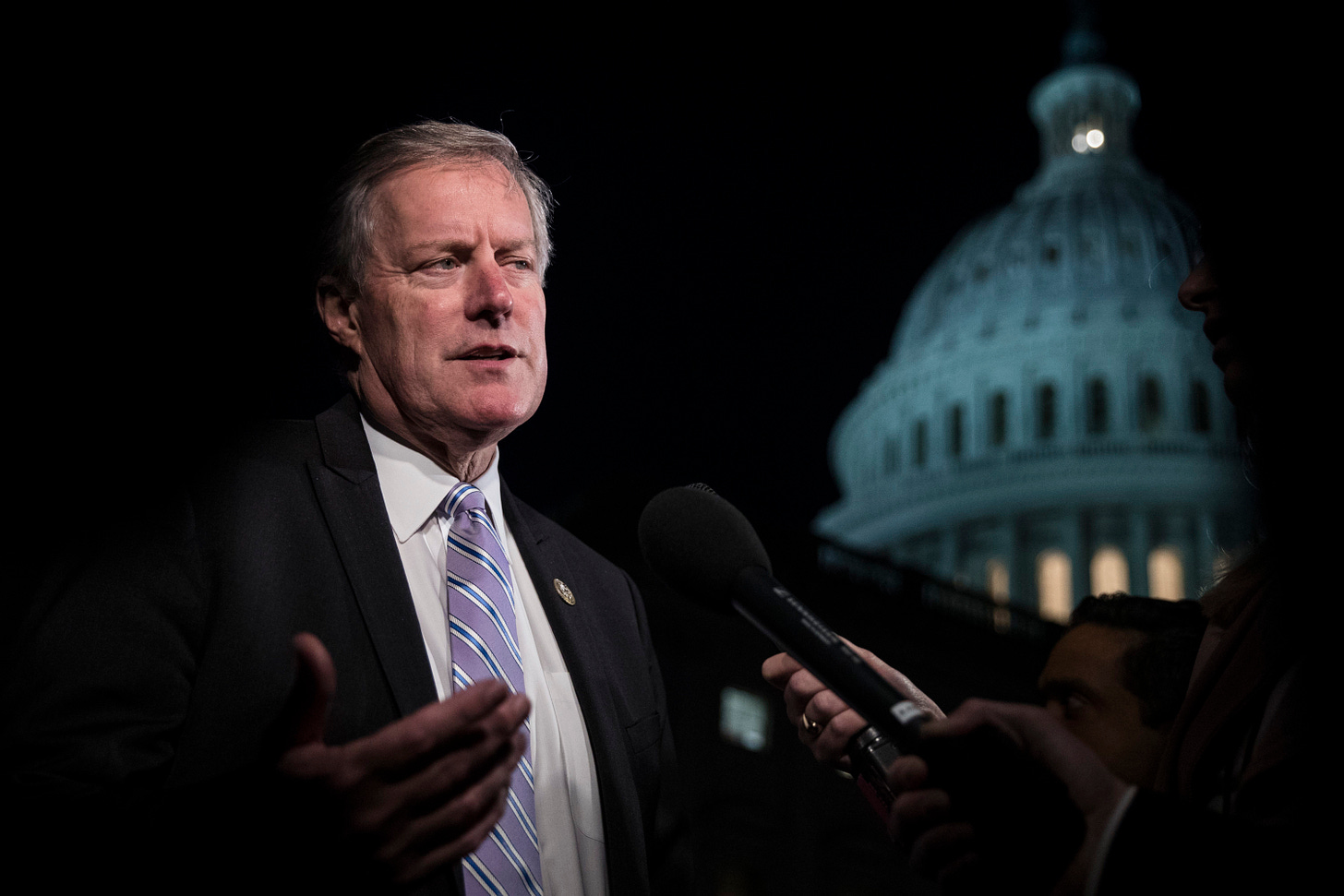The Humiliation of the Freedom Caucus
A majority of those who fought back against Obama's imperial presidency just voted to support Trump's.
The House of Representatives voted Tuesday evening to block President Trump’s declaration of a state of emergency at the U.S.-Mexico border, a move the president took in a last-ditch effort to fulfill his campaign promise to build a wall after he failed to persuade Congress to fund its construction. The bill passed by the substantial—but not veto-proof—margin of 245-182, with 13 GOP representatives joining the Democrats.
Those Republicans include Michigan’s Justin Amash, Texas’s Will Hurd, New York’s Elise Stefanik, and Washington’s Cathy McMorris Rodgers. Their resistance, while commendable, offers little comfort in the face of the deluge of Republican lawmakers—182 of them!—who simply shrugged their shoulders and waved through the president’s power grab. Now President Trump will likely to be forced to issue the first veto of his presidency to defend his national emergency, but the complicity of most of the GOP practically guarantees that the “emergency” will proceed apace.
Every GOP member of the House who went along to get along deserves to be called out, but one group in particular has earned extra condemnation. The House Freedom Caucus has for years touted itself as Congress’s last bastion of true constitutional conservatism. During the Obama years, the group raged incessantly against the imperial presidency. In 2014, after Obama pledged to “take steps without legislation to expand opportunity for more American families” in his State of the Union address, Rep. Mark Meadows, who now chairs the Freedom Caucus, announced that the president had “declared war, and not just on Congress but the American people.”
“In him trying to bypass Congress he fails to realize that his party was in control for two years,” Meadows told Fox News then. “And many of the things we’re addressing today he didn’t address when he had a majority… When he talks about bypassing Congress, he’s really talking about bypassing the American people and their will, and the fact that they showed up and voted.”
Sound familiar? Yet oddly enough, Meadows is singing a different tune today.
“Does the president have the right and the ability to do it? Yes. Would most of us prefer a legislative option? Yes,” Meadows told reporters of the national emergency declaration last month. “Most conservatives want it to be the last resort he would use. But those same conservatives, I’m sure, if it’s deployed, would embrace him as having done all he could do to negotiate with Democrats.”
The fact that Republicans controlled both houses of Congress and the White House for two years, until voters restored Democrats back into control of the House in 2018— largely as a referendum on Trump’s immigration policies—appears to have played a diminished role in Meadows’ calculations this time around.
The end result: only two of the roughly three-dozen lawmakers affiliated with the Freedom Caucus, Amash and Thomas Massie, voted to block Trump’s national emergency declaration. Put another way: Freedom Caucusers were slightly more likely than the average House Republican to vote to green-light Trump’s national emergency. Once limited government’s self-styled staunchest defenders, the Freedom Caucus is now throwing itself behind the Trump-brand imperial presidency even more enthusiastically than the rank-and-file RINOs its members love to deride.
Members of the Freedom Caucus naturally dispute that their support for the national emergency declaration is hypocritical, arguing that the president currently has the statutory authority to use those powers to go around Congress—even if the statute in question, they admit, is likely a symptom of the very executive overreach they claim to despise. In fact, some are even discussing taking steps to limit the power of the presidency to execute policy by national emergency—just so long as this emergency gets to go forward as the president desires.
“We shouldn’t be challenging this president, when every other president has taken advantage of it,” Freedom Caucuser Paul Gosar told Politico this week. “I would actually love to see a resolution to remove those powers at the next earliest convenience.”
It was not ever thus. In the first year of Trump’s tenure, the Freedom Caucus occasionally lived up to their traditional role as an iconoclastic thorn in the party’s side, most notably when they helped torpedo a GOP effort to reform Obamacare in March 2017 on the grounds that the bill being considered did not sufficiently uproot the Affordable Care Act. This act of insubordination was enough to draw a furious call-out from the president himself:

Lesson learned. The Freedom Caucus troubles the president no more. Say what you will about Trump: He sure knows how to tease hypocrites out into the light of day.
Correction: A previous version of this piece referred to Rep. Thomas Massie as a member of the Freedom Caucus. Massie is often affiliated with the Freedom Caucus, but is not a member of the Caucus.





